Assignment 2: Examining the Moral Status of Prostitution (Philosophy)
VerifiedAdded on 2020/04/21
|7
|1852
|45
Essay
AI Summary
This essay, titled "Assignment 2: Prostitution and Morality," delves into the complex ethical considerations surrounding prostitution. It explores various philosophical viewpoints, including religious perspectives, consequentialism, virtue ethics, and feminism, to determine whether prostitution can be considered morally permissible. The essay argues against the moral permissibility of prostitution, highlighting the sexual objectification of women, the lack of virtues like kindness and love, and the potential for exploitation. It also examines the liberal perspective and its arguments for individual choice and freedom, but ultimately refutes these arguments using Kantian ethics, virtue ethics, and the negative consequences associated with prostitution. The essay concludes that, based on the discussed moral viewpoints, prostitution cannot be deemed morally permissible.

qwertyuiopasdfghjklzxcvbnmqwertyui
opasdfghjklzxcvbnmqwertyuiopasdfgh
jklzxcvbnmqwertyuiopasdfghjklzxcvb
nmqwertyuiopasdfghjklzxcvbnmqwer
tyuiopasdfghjklzxcvbnmqwertyuiopas
dfghjklzxcvbnmqwertyuiopasdfghjklzx
cvbnmqwertyuiopasdfghjklzxcvbnmq
wertyuiopasdfghjklzxcvbnmqwertyuio
pasdfghjklzxcvbnmqwertyuiopasdfghj
Love Sex and Death
Assignment 2
10-Nov-17
(Student Details: )
opasdfghjklzxcvbnmqwertyuiopasdfgh
jklzxcvbnmqwertyuiopasdfghjklzxcvb
nmqwertyuiopasdfghjklzxcvbnmqwer
tyuiopasdfghjklzxcvbnmqwertyuiopas
dfghjklzxcvbnmqwertyuiopasdfghjklzx
cvbnmqwertyuiopasdfghjklzxcvbnmq
wertyuiopasdfghjklzxcvbnmqwertyuio
pasdfghjklzxcvbnmqwertyuiopasdfghj
Love Sex and Death
Assignment 2
10-Nov-17
(Student Details: )
Paraphrase This Document
Need a fresh take? Get an instant paraphrase of this document with our AI Paraphraser
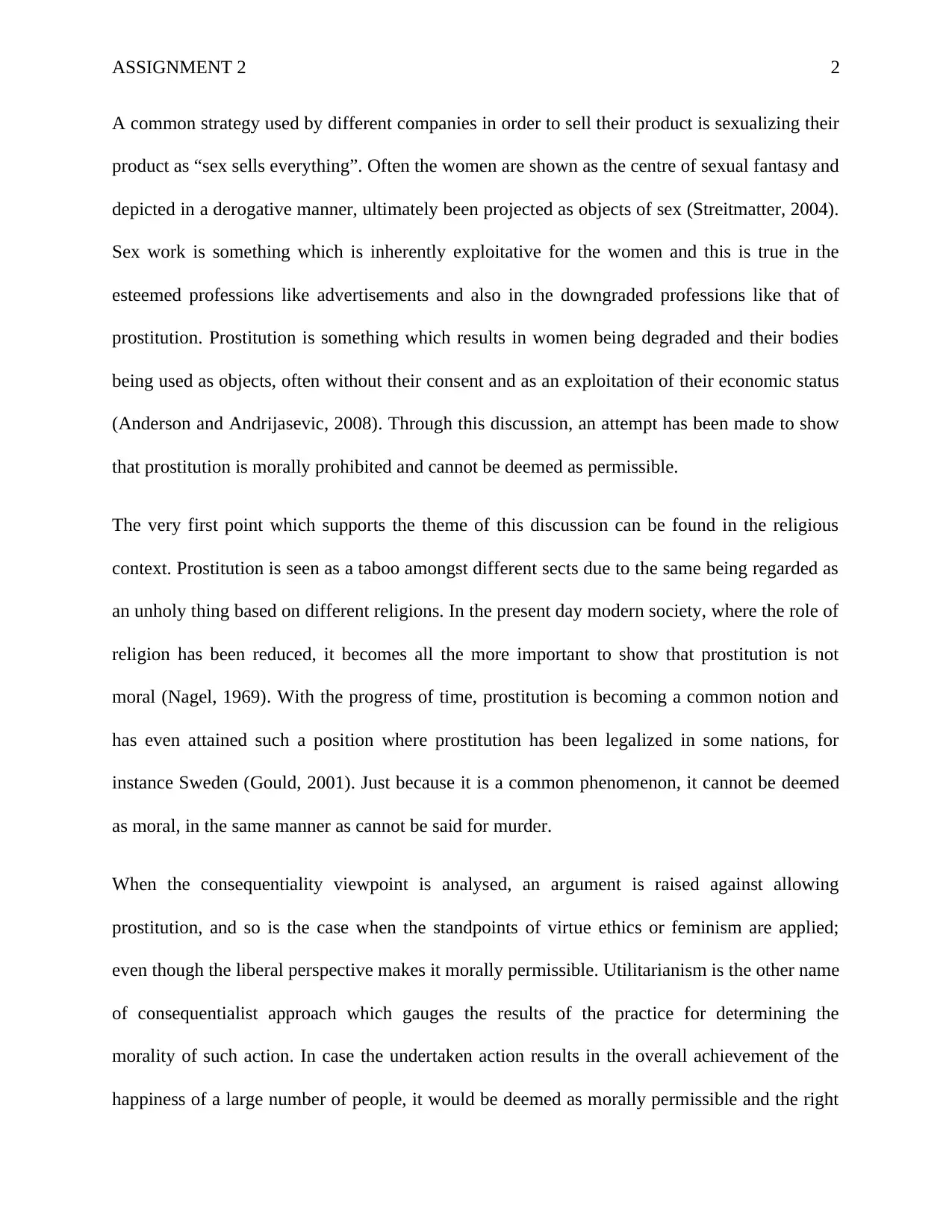
ASSIGNMENT 2 2
A common strategy used by different companies in order to sell their product is sexualizing their
product as “sex sells everything”. Often the women are shown as the centre of sexual fantasy and
depicted in a derogative manner, ultimately been projected as objects of sex (Streitmatter, 2004).
Sex work is something which is inherently exploitative for the women and this is true in the
esteemed professions like advertisements and also in the downgraded professions like that of
prostitution. Prostitution is something which results in women being degraded and their bodies
being used as objects, often without their consent and as an exploitation of their economic status
(Anderson and Andrijasevic, 2008). Through this discussion, an attempt has been made to show
that prostitution is morally prohibited and cannot be deemed as permissible.
The very first point which supports the theme of this discussion can be found in the religious
context. Prostitution is seen as a taboo amongst different sects due to the same being regarded as
an unholy thing based on different religions. In the present day modern society, where the role of
religion has been reduced, it becomes all the more important to show that prostitution is not
moral (Nagel, 1969). With the progress of time, prostitution is becoming a common notion and
has even attained such a position where prostitution has been legalized in some nations, for
instance Sweden (Gould, 2001). Just because it is a common phenomenon, it cannot be deemed
as moral, in the same manner as cannot be said for murder.
When the consequentiality viewpoint is analysed, an argument is raised against allowing
prostitution, and so is the case when the standpoints of virtue ethics or feminism are applied;
even though the liberal perspective makes it morally permissible. Utilitarianism is the other name
of consequentialist approach which gauges the results of the practice for determining the
morality of such action. In case the undertaken action results in the overall achievement of the
happiness of a large number of people, it would be deemed as morally permissible and the right
A common strategy used by different companies in order to sell their product is sexualizing their
product as “sex sells everything”. Often the women are shown as the centre of sexual fantasy and
depicted in a derogative manner, ultimately been projected as objects of sex (Streitmatter, 2004).
Sex work is something which is inherently exploitative for the women and this is true in the
esteemed professions like advertisements and also in the downgraded professions like that of
prostitution. Prostitution is something which results in women being degraded and their bodies
being used as objects, often without their consent and as an exploitation of their economic status
(Anderson and Andrijasevic, 2008). Through this discussion, an attempt has been made to show
that prostitution is morally prohibited and cannot be deemed as permissible.
The very first point which supports the theme of this discussion can be found in the religious
context. Prostitution is seen as a taboo amongst different sects due to the same being regarded as
an unholy thing based on different religions. In the present day modern society, where the role of
religion has been reduced, it becomes all the more important to show that prostitution is not
moral (Nagel, 1969). With the progress of time, prostitution is becoming a common notion and
has even attained such a position where prostitution has been legalized in some nations, for
instance Sweden (Gould, 2001). Just because it is a common phenomenon, it cannot be deemed
as moral, in the same manner as cannot be said for murder.
When the consequentiality viewpoint is analysed, an argument is raised against allowing
prostitution, and so is the case when the standpoints of virtue ethics or feminism are applied;
even though the liberal perspective makes it morally permissible. Utilitarianism is the other name
of consequentialist approach which gauges the results of the practice for determining the
morality of such action. In case the undertaken action results in the overall achievement of the
happiness of a large number of people, it would be deemed as morally permissible and the right
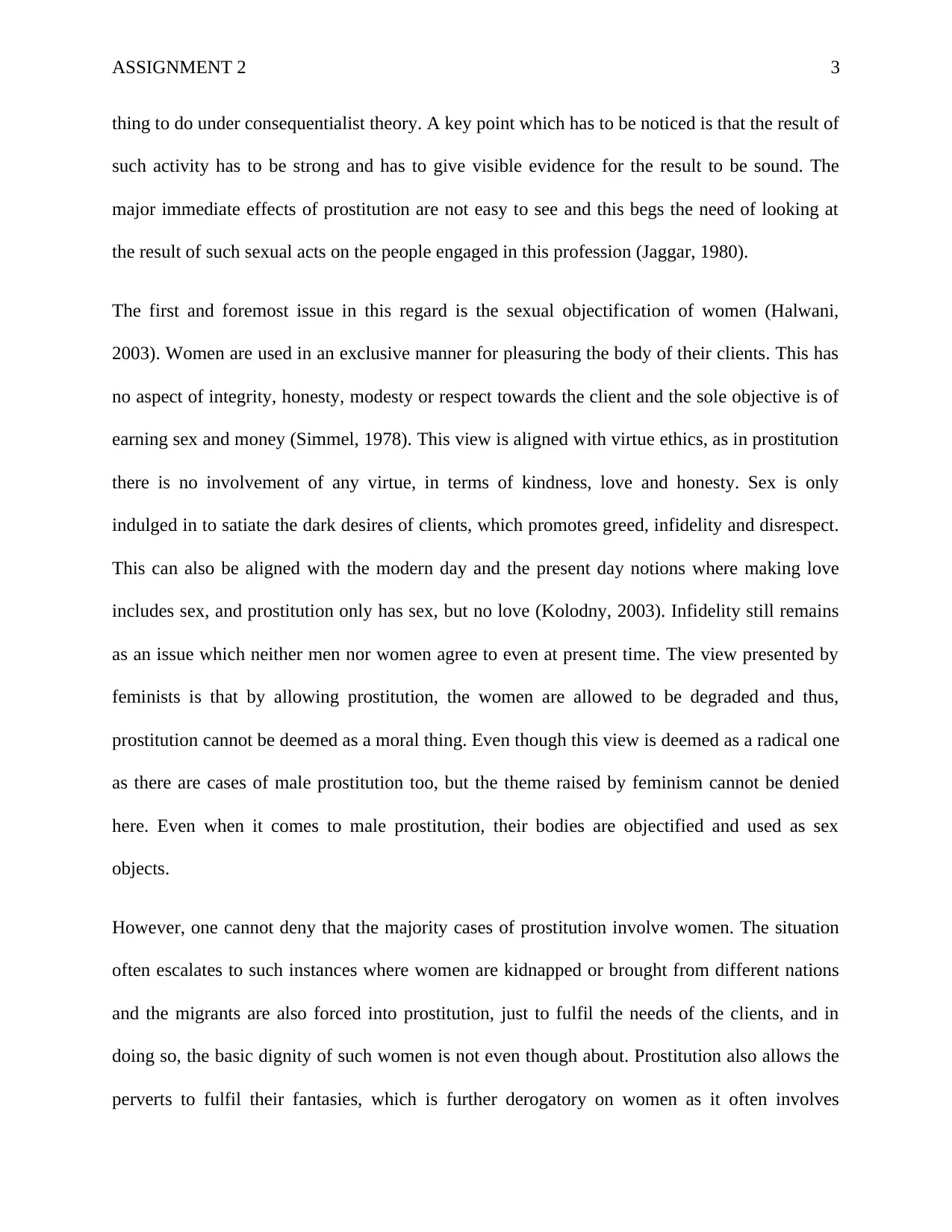
ASSIGNMENT 2 3
thing to do under consequentialist theory. A key point which has to be noticed is that the result of
such activity has to be strong and has to give visible evidence for the result to be sound. The
major immediate effects of prostitution are not easy to see and this begs the need of looking at
the result of such sexual acts on the people engaged in this profession (Jaggar, 1980).
The first and foremost issue in this regard is the sexual objectification of women (Halwani,
2003). Women are used in an exclusive manner for pleasuring the body of their clients. This has
no aspect of integrity, honesty, modesty or respect towards the client and the sole objective is of
earning sex and money (Simmel, 1978). This view is aligned with virtue ethics, as in prostitution
there is no involvement of any virtue, in terms of kindness, love and honesty. Sex is only
indulged in to satiate the dark desires of clients, which promotes greed, infidelity and disrespect.
This can also be aligned with the modern day and the present day notions where making love
includes sex, and prostitution only has sex, but no love (Kolodny, 2003). Infidelity still remains
as an issue which neither men nor women agree to even at present time. The view presented by
feminists is that by allowing prostitution, the women are allowed to be degraded and thus,
prostitution cannot be deemed as a moral thing. Even though this view is deemed as a radical one
as there are cases of male prostitution too, but the theme raised by feminism cannot be denied
here. Even when it comes to male prostitution, their bodies are objectified and used as sex
objects.
However, one cannot deny that the majority cases of prostitution involve women. The situation
often escalates to such instances where women are kidnapped or brought from different nations
and the migrants are also forced into prostitution, just to fulfil the needs of the clients, and in
doing so, the basic dignity of such women is not even though about. Prostitution also allows the
perverts to fulfil their fantasies, which is further derogatory on women as it often involves
thing to do under consequentialist theory. A key point which has to be noticed is that the result of
such activity has to be strong and has to give visible evidence for the result to be sound. The
major immediate effects of prostitution are not easy to see and this begs the need of looking at
the result of such sexual acts on the people engaged in this profession (Jaggar, 1980).
The first and foremost issue in this regard is the sexual objectification of women (Halwani,
2003). Women are used in an exclusive manner for pleasuring the body of their clients. This has
no aspect of integrity, honesty, modesty or respect towards the client and the sole objective is of
earning sex and money (Simmel, 1978). This view is aligned with virtue ethics, as in prostitution
there is no involvement of any virtue, in terms of kindness, love and honesty. Sex is only
indulged in to satiate the dark desires of clients, which promotes greed, infidelity and disrespect.
This can also be aligned with the modern day and the present day notions where making love
includes sex, and prostitution only has sex, but no love (Kolodny, 2003). Infidelity still remains
as an issue which neither men nor women agree to even at present time. The view presented by
feminists is that by allowing prostitution, the women are allowed to be degraded and thus,
prostitution cannot be deemed as a moral thing. Even though this view is deemed as a radical one
as there are cases of male prostitution too, but the theme raised by feminism cannot be denied
here. Even when it comes to male prostitution, their bodies are objectified and used as sex
objects.
However, one cannot deny that the majority cases of prostitution involve women. The situation
often escalates to such instances where women are kidnapped or brought from different nations
and the migrants are also forced into prostitution, just to fulfil the needs of the clients, and in
doing so, the basic dignity of such women is not even though about. Prostitution also allows the
perverts to fulfil their fantasies, which is further derogatory on women as it often involves
⊘ This is a preview!⊘
Do you want full access?
Subscribe today to unlock all pages.

Trusted by 1+ million students worldwide
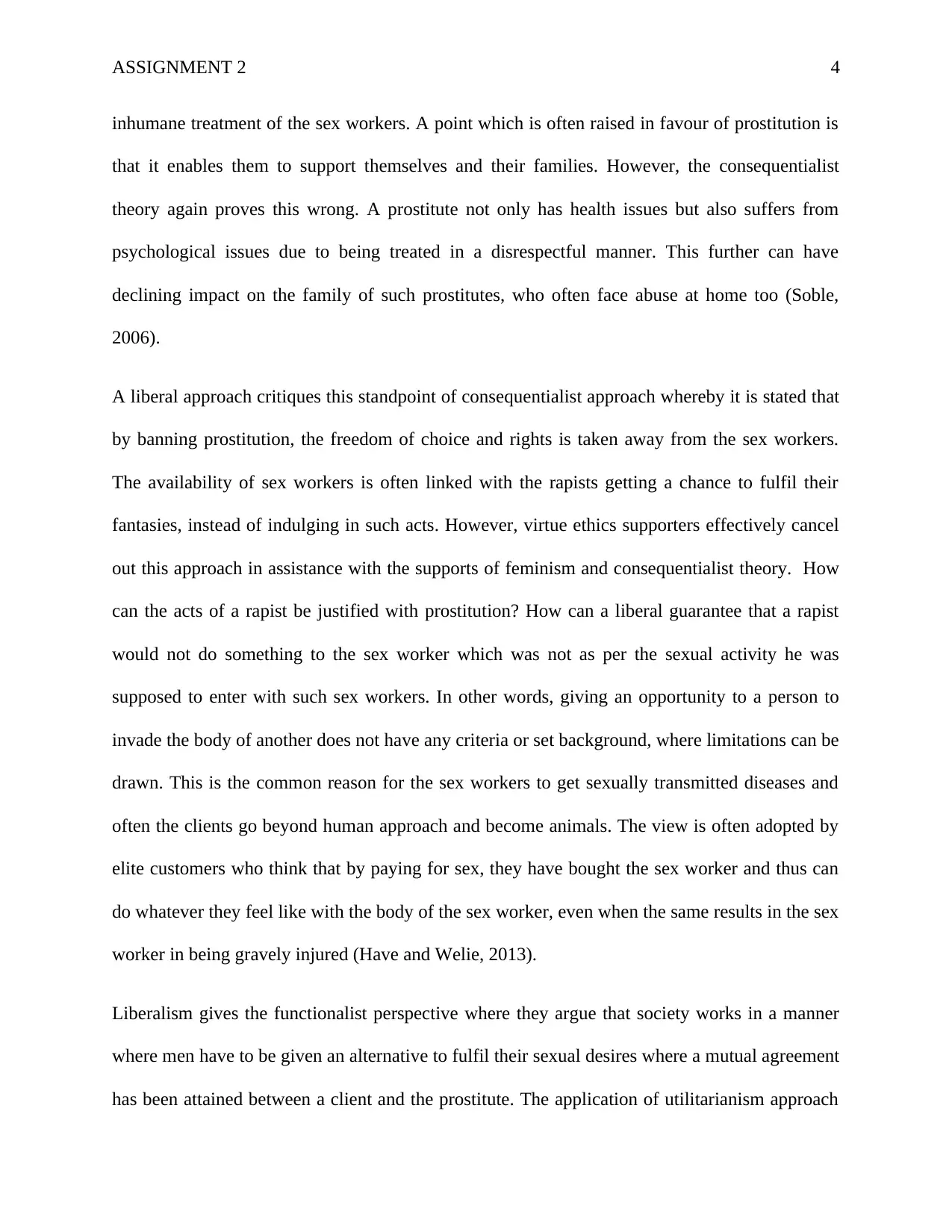
ASSIGNMENT 2 4
inhumane treatment of the sex workers. A point which is often raised in favour of prostitution is
that it enables them to support themselves and their families. However, the consequentialist
theory again proves this wrong. A prostitute not only has health issues but also suffers from
psychological issues due to being treated in a disrespectful manner. This further can have
declining impact on the family of such prostitutes, who often face abuse at home too (Soble,
2006).
A liberal approach critiques this standpoint of consequentialist approach whereby it is stated that
by banning prostitution, the freedom of choice and rights is taken away from the sex workers.
The availability of sex workers is often linked with the rapists getting a chance to fulfil their
fantasies, instead of indulging in such acts. However, virtue ethics supporters effectively cancel
out this approach in assistance with the supports of feminism and consequentialist theory. How
can the acts of a rapist be justified with prostitution? How can a liberal guarantee that a rapist
would not do something to the sex worker which was not as per the sexual activity he was
supposed to enter with such sex workers. In other words, giving an opportunity to a person to
invade the body of another does not have any criteria or set background, where limitations can be
drawn. This is the common reason for the sex workers to get sexually transmitted diseases and
often the clients go beyond human approach and become animals. The view is often adopted by
elite customers who think that by paying for sex, they have bought the sex worker and thus can
do whatever they feel like with the body of the sex worker, even when the same results in the sex
worker in being gravely injured (Have and Welie, 2013).
Liberalism gives the functionalist perspective where they argue that society works in a manner
where men have to be given an alternative to fulfil their sexual desires where a mutual agreement
has been attained between a client and the prostitute. The application of utilitarianism approach
inhumane treatment of the sex workers. A point which is often raised in favour of prostitution is
that it enables them to support themselves and their families. However, the consequentialist
theory again proves this wrong. A prostitute not only has health issues but also suffers from
psychological issues due to being treated in a disrespectful manner. This further can have
declining impact on the family of such prostitutes, who often face abuse at home too (Soble,
2006).
A liberal approach critiques this standpoint of consequentialist approach whereby it is stated that
by banning prostitution, the freedom of choice and rights is taken away from the sex workers.
The availability of sex workers is often linked with the rapists getting a chance to fulfil their
fantasies, instead of indulging in such acts. However, virtue ethics supporters effectively cancel
out this approach in assistance with the supports of feminism and consequentialist theory. How
can the acts of a rapist be justified with prostitution? How can a liberal guarantee that a rapist
would not do something to the sex worker which was not as per the sexual activity he was
supposed to enter with such sex workers. In other words, giving an opportunity to a person to
invade the body of another does not have any criteria or set background, where limitations can be
drawn. This is the common reason for the sex workers to get sexually transmitted diseases and
often the clients go beyond human approach and become animals. The view is often adopted by
elite customers who think that by paying for sex, they have bought the sex worker and thus can
do whatever they feel like with the body of the sex worker, even when the same results in the sex
worker in being gravely injured (Have and Welie, 2013).
Liberalism gives the functionalist perspective where they argue that society works in a manner
where men have to be given an alternative to fulfil their sexual desires where a mutual agreement
has been attained between a client and the prostitute. The application of utilitarianism approach
Paraphrase This Document
Need a fresh take? Get an instant paraphrase of this document with our AI Paraphraser
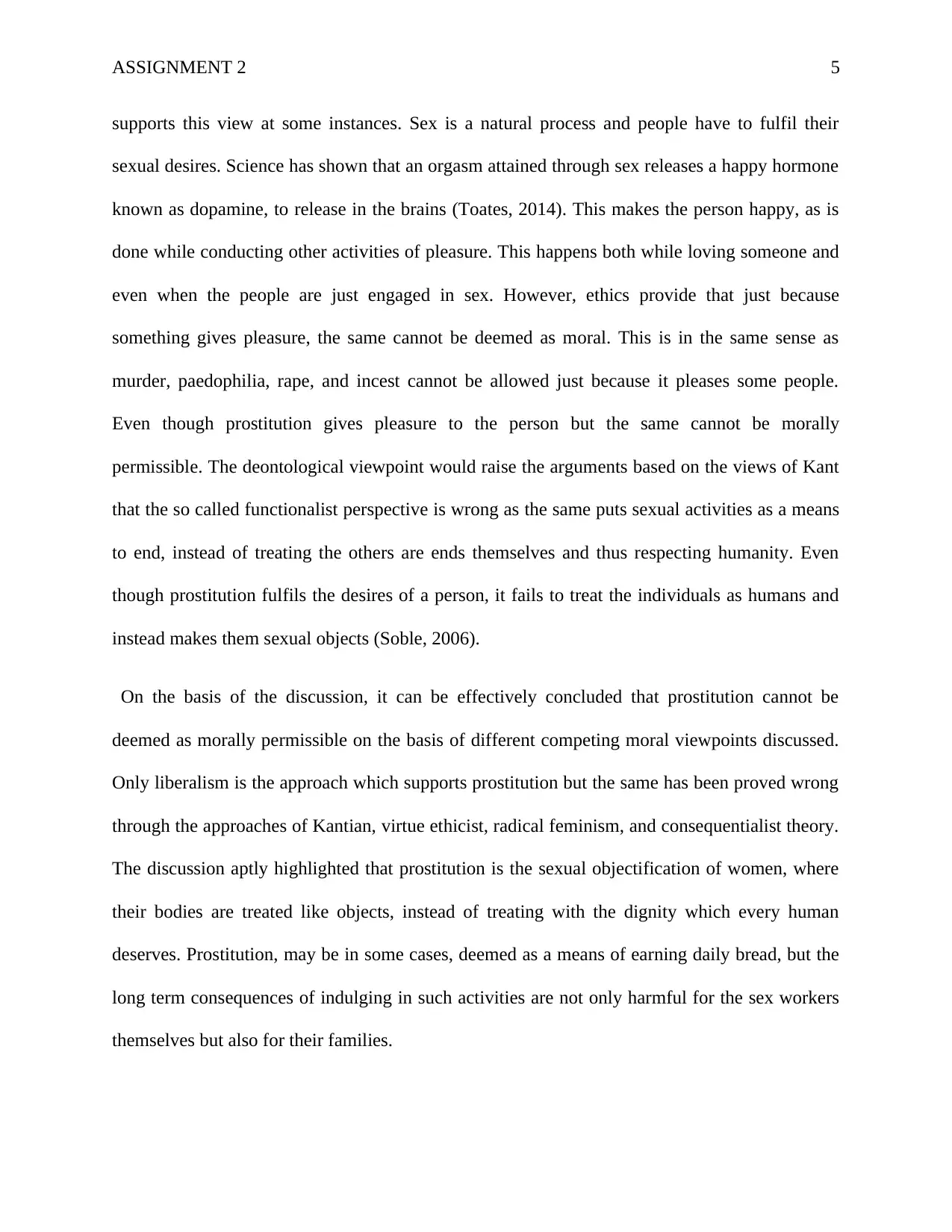
ASSIGNMENT 2 5
supports this view at some instances. Sex is a natural process and people have to fulfil their
sexual desires. Science has shown that an orgasm attained through sex releases a happy hormone
known as dopamine, to release in the brains (Toates, 2014). This makes the person happy, as is
done while conducting other activities of pleasure. This happens both while loving someone and
even when the people are just engaged in sex. However, ethics provide that just because
something gives pleasure, the same cannot be deemed as moral. This is in the same sense as
murder, paedophilia, rape, and incest cannot be allowed just because it pleases some people.
Even though prostitution gives pleasure to the person but the same cannot be morally
permissible. The deontological viewpoint would raise the arguments based on the views of Kant
that the so called functionalist perspective is wrong as the same puts sexual activities as a means
to end, instead of treating the others are ends themselves and thus respecting humanity. Even
though prostitution fulfils the desires of a person, it fails to treat the individuals as humans and
instead makes them sexual objects (Soble, 2006).
On the basis of the discussion, it can be effectively concluded that prostitution cannot be
deemed as morally permissible on the basis of different competing moral viewpoints discussed.
Only liberalism is the approach which supports prostitution but the same has been proved wrong
through the approaches of Kantian, virtue ethicist, radical feminism, and consequentialist theory.
The discussion aptly highlighted that prostitution is the sexual objectification of women, where
their bodies are treated like objects, instead of treating with the dignity which every human
deserves. Prostitution, may be in some cases, deemed as a means of earning daily bread, but the
long term consequences of indulging in such activities are not only harmful for the sex workers
themselves but also for their families.
supports this view at some instances. Sex is a natural process and people have to fulfil their
sexual desires. Science has shown that an orgasm attained through sex releases a happy hormone
known as dopamine, to release in the brains (Toates, 2014). This makes the person happy, as is
done while conducting other activities of pleasure. This happens both while loving someone and
even when the people are just engaged in sex. However, ethics provide that just because
something gives pleasure, the same cannot be deemed as moral. This is in the same sense as
murder, paedophilia, rape, and incest cannot be allowed just because it pleases some people.
Even though prostitution gives pleasure to the person but the same cannot be morally
permissible. The deontological viewpoint would raise the arguments based on the views of Kant
that the so called functionalist perspective is wrong as the same puts sexual activities as a means
to end, instead of treating the others are ends themselves and thus respecting humanity. Even
though prostitution fulfils the desires of a person, it fails to treat the individuals as humans and
instead makes them sexual objects (Soble, 2006).
On the basis of the discussion, it can be effectively concluded that prostitution cannot be
deemed as morally permissible on the basis of different competing moral viewpoints discussed.
Only liberalism is the approach which supports prostitution but the same has been proved wrong
through the approaches of Kantian, virtue ethicist, radical feminism, and consequentialist theory.
The discussion aptly highlighted that prostitution is the sexual objectification of women, where
their bodies are treated like objects, instead of treating with the dignity which every human
deserves. Prostitution, may be in some cases, deemed as a means of earning daily bread, but the
long term consequences of indulging in such activities are not only harmful for the sex workers
themselves but also for their families.
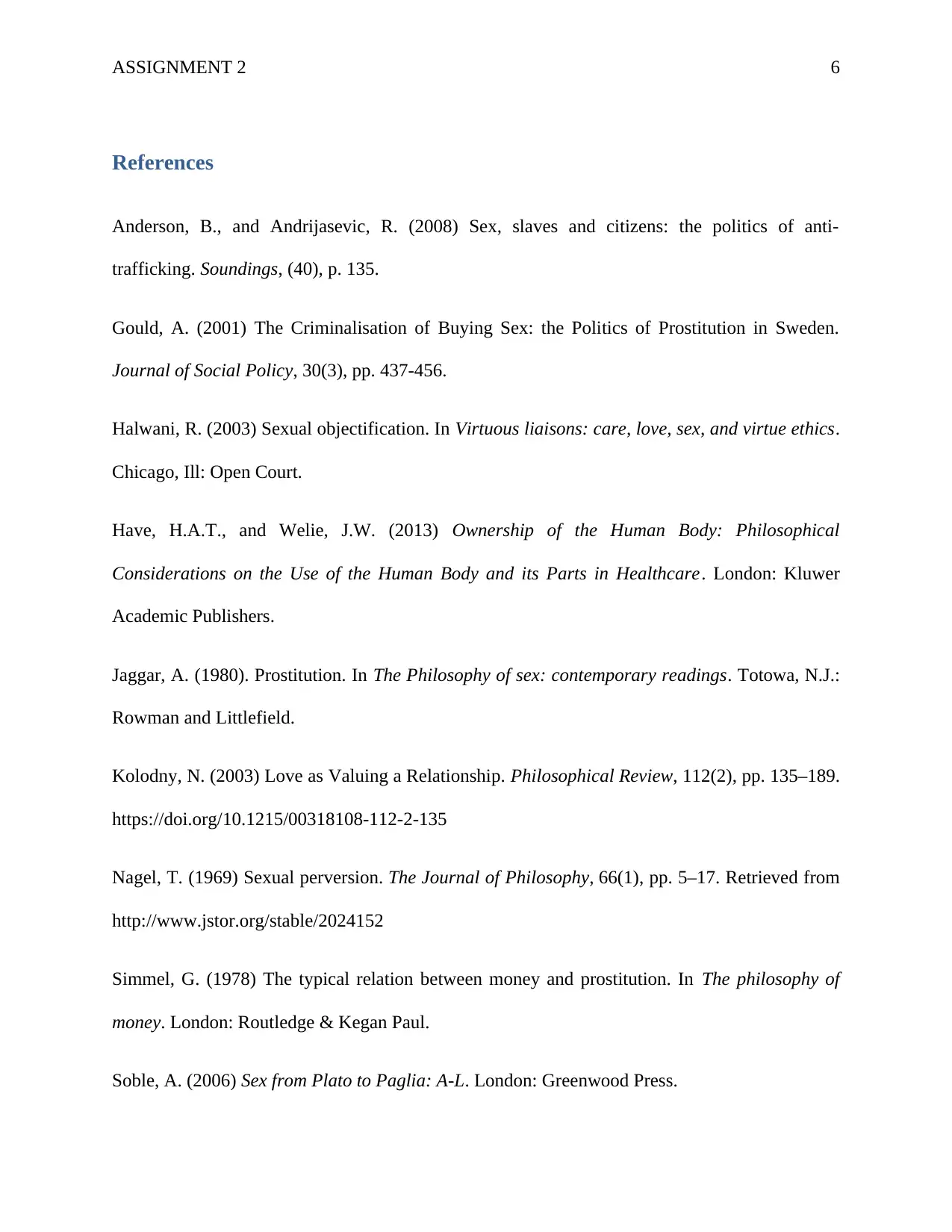
ASSIGNMENT 2 6
References
Anderson, B., and Andrijasevic, R. (2008) Sex, slaves and citizens: the politics of anti-
trafficking. Soundings, (40), p. 135.
Gould, A. (2001) The Criminalisation of Buying Sex: the Politics of Prostitution in Sweden.
Journal of Social Policy, 30(3), pp. 437-456.
Halwani, R. (2003) Sexual objectification. In Virtuous liaisons: care, love, sex, and virtue ethics.
Chicago, Ill: Open Court.
Have, H.A.T., and Welie, J.W. (2013) Ownership of the Human Body: Philosophical
Considerations on the Use of the Human Body and its Parts in Healthcare. London: Kluwer
Academic Publishers.
Jaggar, A. (1980). Prostitution. In The Philosophy of sex: contemporary readings. Totowa, N.J.:
Rowman and Littlefield.
Kolodny, N. (2003) Love as Valuing a Relationship. Philosophical Review, 112(2), pp. 135–189.
https://doi.org/10.1215/00318108-112-2-135
Nagel, T. (1969) Sexual perversion. The Journal of Philosophy, 66(1), pp. 5–17. Retrieved from
http://www.jstor.org/stable/2024152
Simmel, G. (1978) The typical relation between money and prostitution. In The philosophy of
money. London: Routledge & Kegan Paul.
Soble, A. (2006) Sex from Plato to Paglia: A-L. London: Greenwood Press.
References
Anderson, B., and Andrijasevic, R. (2008) Sex, slaves and citizens: the politics of anti-
trafficking. Soundings, (40), p. 135.
Gould, A. (2001) The Criminalisation of Buying Sex: the Politics of Prostitution in Sweden.
Journal of Social Policy, 30(3), pp. 437-456.
Halwani, R. (2003) Sexual objectification. In Virtuous liaisons: care, love, sex, and virtue ethics.
Chicago, Ill: Open Court.
Have, H.A.T., and Welie, J.W. (2013) Ownership of the Human Body: Philosophical
Considerations on the Use of the Human Body and its Parts in Healthcare. London: Kluwer
Academic Publishers.
Jaggar, A. (1980). Prostitution. In The Philosophy of sex: contemporary readings. Totowa, N.J.:
Rowman and Littlefield.
Kolodny, N. (2003) Love as Valuing a Relationship. Philosophical Review, 112(2), pp. 135–189.
https://doi.org/10.1215/00318108-112-2-135
Nagel, T. (1969) Sexual perversion. The Journal of Philosophy, 66(1), pp. 5–17. Retrieved from
http://www.jstor.org/stable/2024152
Simmel, G. (1978) The typical relation between money and prostitution. In The philosophy of
money. London: Routledge & Kegan Paul.
Soble, A. (2006) Sex from Plato to Paglia: A-L. London: Greenwood Press.
⊘ This is a preview!⊘
Do you want full access?
Subscribe today to unlock all pages.

Trusted by 1+ million students worldwide

ASSIGNMENT 2 7
Streitmatter, R. (2004) Sex Sells!: The Media's Journey from Repression to Obsession. Boulder,
Colorado, United States: Westview Press.
Toates, F. (2014) How Sexual Desire Works. Cambridge: Cambridge University Press.
Streitmatter, R. (2004) Sex Sells!: The Media's Journey from Repression to Obsession. Boulder,
Colorado, United States: Westview Press.
Toates, F. (2014) How Sexual Desire Works. Cambridge: Cambridge University Press.
1 out of 7
Related Documents
Your All-in-One AI-Powered Toolkit for Academic Success.
+13062052269
info@desklib.com
Available 24*7 on WhatsApp / Email
![[object Object]](/_next/static/media/star-bottom.7253800d.svg)
Unlock your academic potential
Copyright © 2020–2026 A2Z Services. All Rights Reserved. Developed and managed by ZUCOL.





